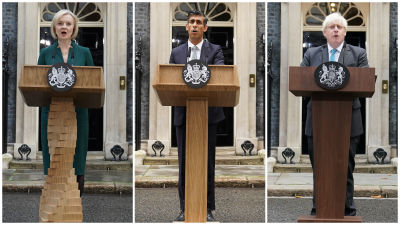Insight
Three PMs and four chancellors: A rollercoaster political year in review

Over the past six years, British politics has been on an almost constant rollercoaster ride, from Brexit, to Covid, and on into a cost of living crisis.
Throughout that entire period, if I told someone I was a political reporter, they would respond with something like, "gosh, you must be busy".
And yet, somehow, 2022 managed to top all of it - at least in Westminster terms.
If we wind back to the beginning of the year, the idea that we would end it on our third prime minister and fourth chancellor would have seemed impossible, even with the crisis already engulfing Boris Johnson back then.
In many ways, January 2022 was a low point for him as the Partygate scandal hit a peak. I remember Conservative MPs telling me his time was up and it was time for a "managed exit".
By April, those same MPs had become cheerleaders for his leadership. The Ukraine war - and a strong response from the UK and Johnson in particular - changed everything inside the Conservative Party.
For a while, even in the face of damning findings on Partygate from senior civil servant Sue Gray, it seemed that Mr Johnson would survive.
But public anger had not dissipated, and Tory MPs couldn’t ignore that. I remember hearing it again and again during by-elections in north Shropshire and then Tiverton and beyond.
People had sacrificed so much through Covid and so were furious with the prime minister, not just because of the parties but also because of the attempt to cover it up as the revelations began to emerge.
People no longer believed Mr Johnson, and that was in the end what brought him down. Not Partygate directly, but another question of integrity around the appointment of his colleague Chris Pincher and claims of bullying and harassment.
Mr Johnson “forgot” that he’d been told about claims around Mr Pincher. That was too much for the party.
And so Mr Johnson’s premiership, which he wanted to be remembered for getting Brexit done, was instead defined - at least in the end - by a catastrophic loss of trust in the Conservative Party.
There was perhaps a moment then, when a new Tory leader could have recovered support for the party.
But no one could have guessed that the trust deficit would soon be eclipsed by an even bigger problem, especially for this party - a catastrophic decline in its reputation for competence.
Sometimes you have to wonder if the Liz Truss era actually happened. It was so frantic, head-spinning and short.
Ms Truss, who had always heralded the strength of the free markets, was swiftly brought down by them after she ignored warnings about inflationary tax cuts and went even further than she had suggested during the summer leadership contest.
It was mortgages that did it for her. A Conservative prime minister simply can't steer homeowners into such fierce economic winds and expect to survive.
When she originally won, Rishi Sunak's team thought that was it for their political lives, as most of them prepared to drift back towards the private sector.
For them to be back, so quickly, is just mind-boggling. For most Tory MPs it was a huge relief and there was genuine excitement when he took over. But since then, a reality check - as they have started to face up to the state of the country and the state of play for their party.
2022 was the year the Conservative Party, after 12 years in power, cemented a reputation for dishonesty and incompetence.
Can they come back from that?
Insiders who have seen the party's own polling data don't think so. Two years is a long time and a lot can change. But right now, many within the party think they are staring down the barrel of electoral defeat.
Turning that around would be hard enough in good economic times. Mr Sunak has to try to do it as the country hits a winter of discontent, with rolling strikes that include, for the first time in their history, nurses.
He has to do it at a time when the cost of living crisis is driving more and more families into poverty and resulting in one in four hospitals setting up foodbanks for staff.
He has to do it at a time when the Labour Party is being taken more seriously than it has been for years.
His single gamble is on controlling inflation.
If he can help get it under control (and that is why he is not budging on NHS pay) he thinks there maybe a chance of a recovery in 2024.
It looks very difficult. But if there is one thing that 2022 has taught us - it's that you probably can't make political predictions two months out, nevermind two years.
Want a quick and expert briefing on the biggest news stories? Listen to our latest podcasts to find out What You Need To Know.